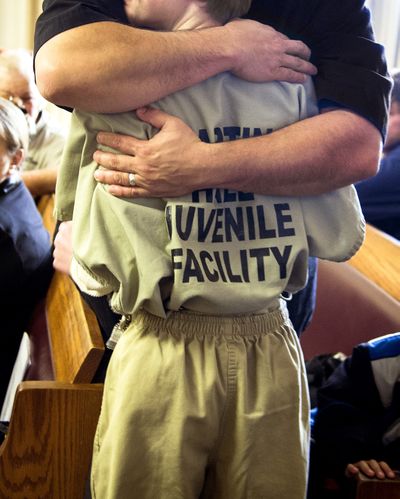Colville boy gets four years for intent to murder
Friends, family ask for leniency during sentencing

COLVILLE – A Stevens County judge was asked Wednesday to decide whether the shackled 11-year-old boy seated before him, convicted of conspiring to murder a female classmate, posed a threat to society or was a victim of its failures.
Ordering a sentence of more than four years, Judge Allen Nielson said releasing him would be a disservice to the community, rocked by the revelation in February that two Fort Colville Elementary students had smuggled weapons into the school with what police said was an intent to kill.
“I have the primary conspirator here today,” Nielson said minutes before sentencing the boy, who will turn 12 later this week, to 176 weeks to 220 weeks confinement at Echo Glen Children’s Center in Snoqualmie, Wash. His co-conspirator has been serving a similar sentence since he pleaded guilty to charges in April.
“There’s something ultimately fair about the two boys receiving the same sentence,” said Stevens County Prosecuting Attorney Tim Rasmussen after the hearing.
The boy’s grandparents, who have raised him after the death of his father and in the absence of his mother, asked the judge to release him under their care, noting he has already served more than 20 weeks in juvenile detention. Nielson found at trial that the boy exhibited signs of rare pediatric bipolar disorder but ruled the illness did not affect his capacity to distinguish right from wrong.
After the sentencing, the boy’s grandmother said she did not “honestly believe” the two boys intended to carry through on their plan to kill the girl and dismissed Nielson’s finding that her son was the “leader” in the plot.
“I’m glad nobody actually got hurt,” she said.
Rasmussen disagreed, saying Colville came “very close” to a gun-violence tragedy that has befallen other communities.
“I have no doubt that the plot was real and that it was going to result in the death of one or more students,” he said.
A knife and a handgun were found in the other boy’s backpack by school officials the morning of Feb. 7. In an interview with school counselors after the discovery, the boy grew agitated before detailing the plan to stab to death a girl he said was “annoying” while his friend would shoot anyone who tried to intervene. He also produced an alleged list of targets in addition to the girl.
The Spokesman-Review is not naming the suspects or the victim in the case because they are juveniles not charged as adults.
School counselor Deborah Rogers, one of those who interviewed the boy before he was arrested, said Fort Colville continues to deal with issues prompted by the discovery of the weapons.
“His actions were not just a foolish, childish prank,” Rogers said, adding absences quintupled at the school the day after the incident. “They were serious, with lasting consequences.”
Supporters packed two rows of seats directly behind the boy, clad in a tan Martin Hall Detention Center jumpsuit and sporting a slight cowlick of brown hair at the back of his head. He turned to smile at each of them as they came to the defense table and asked Nielson for leniency, the biggest grin saved for Little League coach Kimo Morrison.
Morrison asked Nielson to consider the boy’s age when handing down a sentence.
“I see a nation, for me, that puts adult charges and reprimands children with adult punishments that just don’t seem fit for children that are 11 or 10 years old,” Morrison said, adding that he owed his circumstances to the patience of a prosecutor who sought rehabilitation after a childhood incident in which he shot out windows of parked school buses in the early 1980s.
Leona Adams, who said she was the boy’s preschool teacher and had known him since he was 4 years old, questioned whether the Colville School District did enough to identify his social issues prior to the incident.
“It was a failure on the part of the educational adults around him, who did not pay attention and intervene for a child who was failing socially,” Adams said.
Nielson dismissed claims by defense attorney Don Richter that the boy’s bipolar disorder diminished his role in the plot.
Richter said after the hearing he has already appealed the guilty verdict and plans to appeal the length of the sentence, which is longer than that mandated under state law for the conspiracy charge.
“This is an important case that has far-reaching consequences for juveniles in our state,” Richter said.
The boy’s grandmother said the trial has been difficult for the family. She said she wished she’d known the boy and his intended target were having troubles, so she could call the girl’s parents and sort them out before the plot was hatched.
“I hope that someday they can forgive (our grandson),” she said.